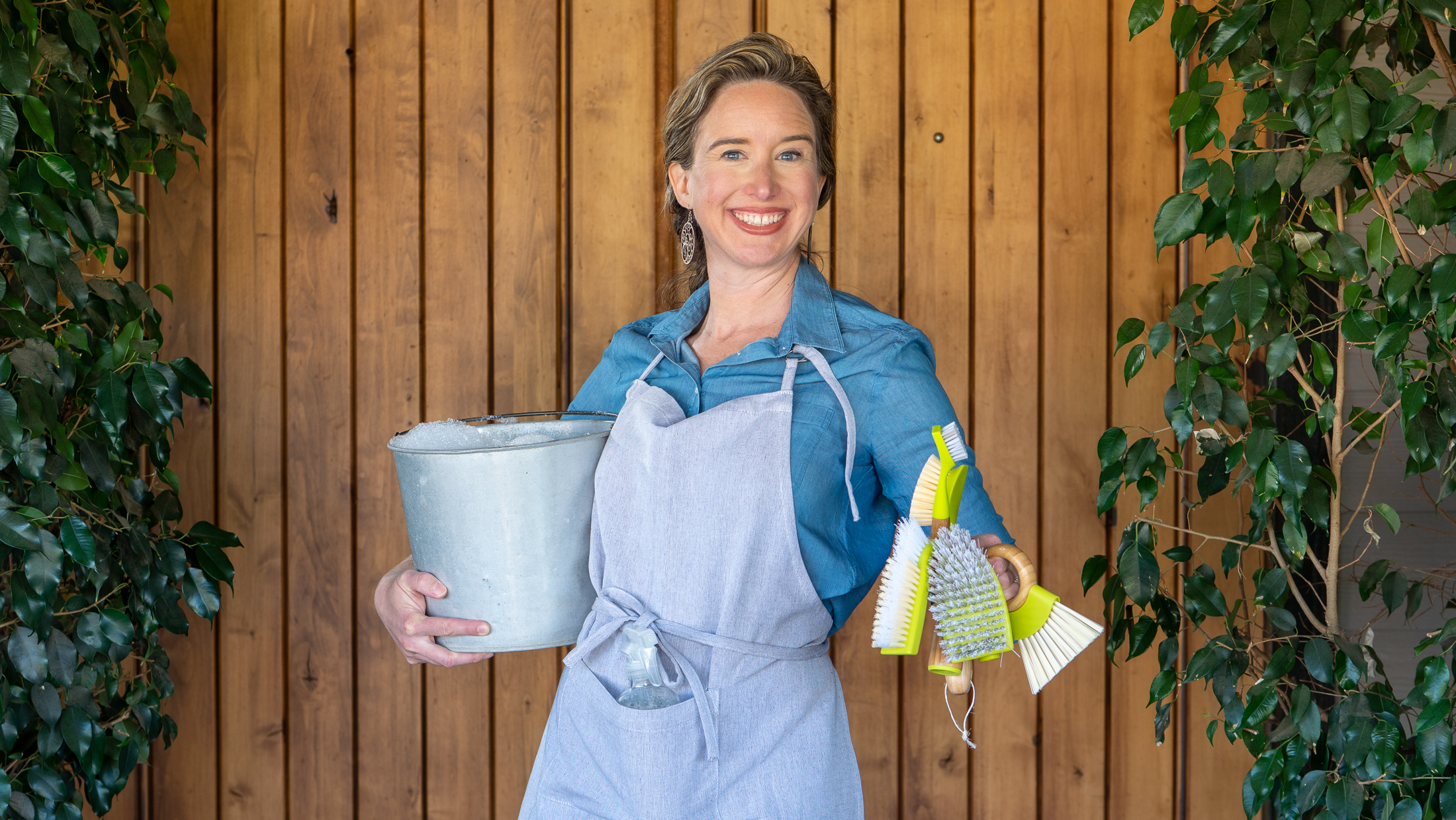
You know you want to. You’ve been meaning to for ages. Everybody’s doing it. It’s so easy!
Today is the day you will finally swap out your conventional cleaning products and put together your Green Cleaning Starter Kit.
The tenets of a Green Cleaning Starter Kit are simple: versatile, effective, safe. Your Kit will contain three Green-It-Yourself (GIY) recipes. With just these three, you’ll be able to clean the vast majority of surfaces in your house. The ingredients are common things, most of which you probably already have in your pantry. Each component cleans a variety of surfaces, poses little to no risk to the user even in cases of accidental exposure, and is fume-free and residue-free. As an extra perk, your Kit will also save you time, space, and money.
Here’s a demonstration video to get you started:
What supplies are needed for green cleaning?
- 2 – 16oz (550 mL) or quart-sized (1 L) spray bottles – good heavy-duty ones
- Distilled white vinegar
- Water – Distilled, reverse osmosis, or filtered water will give you the clearest solutions, but tap water works as well
- 1 shaker jar with holes in the lid – such as an old spice jar or a mason jar
- Baking soda – Same stuff as you cook with, but best to buy in a big bulk bag
- Optional: Essential oils– tea tree for an extra cleaning punch, and any other essential oil that makes you happy
- Microfiber cloths – durable ones from the auto care section are my go-to, but old t-shirts or towels are great options too. They must be absorbent and lint-free
- Good sturdy brushes – for grout and other nooks and crannies
- My Cheat Sheets for Dr. Bronner’s Castile Magic Soap and Sal Suds
To keep things simple in the video, I use the Dr. Bronner’s Pure-Castile Magic Soap for the All-Purpose Spray. However, if you have snooped around my blog, you know that you can also make an All-Purpose Spray with Dr. Bronner’s Sal Suds.
The three green cleaners at the heart of a Green Cleaning Starter Kit
These 3 GIY (Green-It-Yourself) recipes make up the core of the Green Cleaning Kit and replace a multitude of conventional cleaners. Use these simple and versatile cleaners to clean nearly every surface, corner, and crevice of your home.
GIY* All-Purpose Spray
2 Tbsp. (15mL) Dr. Bronner’s Castile Magic Soap or ½ Tbsp. (7.5mL) Dr. Bronner’s Sal Suds in 2 c (500mL). water. Swirl these together in a spray bottle.
Uses: Spray and wipe with a damp cloth to clean bathroom and kitchen surfaces, including stone & tile, stainless steel, painted wood, doorknobs & light switches. Also great for painted walls, most wood, spot cleaning carpets and upholstery, outdoor furniture, and any large object like high chairs. Read more about the GIY All-Purpose Spray here. This is the workhorse of your green cleaning kit.
GIY Glass Cleaner
In a spray bottle, combine distilled white vinegar with water in equal parts.
Uses: Windows, mirrors, other glass surfaces. Read more about the GIY Glass Cleaner here.
GIY Scouring Powder
2 cups (500mL) Baking soda, optionally scented with essential oils. I keep mine in a mason jar with a shaker lid.
Uses: Scouring sinks, tubs, showers, toilets, and other hard surfaces that need extra scouring. Spot test, though, to be sure the surface is scratch resistant. Also, deodorize carpets by sprinkling this on, brushing it in, letting it sit 10 minutes, and vacuuming it out.
Green cleaning FAQs
Over the years, quite a few FAQs have come my way from folks who are just getting started. Perhaps these may help you:
What is green cleaning?
I realize this is a subjective phrase, and unfortunately trendy, so let me share what I mean by green cleaning. Going green is about leaving the world better than we found it. This holds true whether we’re talking about the world inside our bodies, the world inside our houses, or the great big world out there and beyond. When it comes to green cleaning practices, they must promote the health and well-being of people, animals, and the environment. They must do no harm. This is the opposite of many conventional cleaners, which may deliver on the promise to kill germs or cut crud, but with profound side effects to people, pets, and planet. These sorts of cleaners are not necessary. We can do better.
Where do you start green cleaning?
The very first step of green cleaning has nothing to do with sprays or solutions. It begins with a good dusting and vacuuming. Use soft, lint-free cloths dampened only with water to dust all surfaces thoroughly. Then, vacuum all flooring and upholstery, using a machine with a HEPA filter.
After this comes the cleaning of surfaces. If you want to take this one step at a time, start with the glass cleaner. It’s an easy win. Swap out what you’re buying and just use the vinegar/water combo. Grab an absorbent cloth and go clean your bathroom mirrors, shower doors, and that spot at the front window that your dog always puts her nose on. This will be super motivating to keep going. You’ll be looking for other things to clean, and you’ll almost be disappointed when you can’t think of anything else!
Why is soap the center of the Green Cleaning Starter Kit?
Although soap has been around for millennia, we have yet to come up with anything better. Don’t diss it simply because it’s old. Washing hands with soap and water is still unequivocally the first and best defense against illness. Washing surfaces with soap and water is the first and best step per every health organization when keeping homes, offices, and any spaces clean.
Soap cleans by removing, not by killing. But once all debris, including bacteria, viruses, and other microbes—have been removed from surfaces, there is nothing there that needs killing. This is why disinfecting should not be a regular part of cleaning, despite what advertising tells you. Soap-cleaned surfaces are already cleaned, and disinfectants expose us to a wealth of hazards with no arguable advantage. Soap and water is all you need.
Do green cleaning products work as well as conventional?
Yes, and better. Soap, water, vinegar, and baking soda leave surfaces clean, shiny, fresh-smelling, and beautiful. They remove all manner of debris from dirt and stains to germs and microbes. However, they work differently, so take a moment to learn how to use them.
How will natural cleaning products save me time?
Green cleaners are simpler and necessitate fewer steps in your cleaning routine. The promised convenience of conventional cleaners to “spray and go” doesn’t actually remove debris from surfaces. Plus, to be healthful, you have to remove in a second step all the residues left behind, especially for the sake of vulnerable occupants of your spaces such as children, pets, and anyone with sensitivities. Then you have to take care to store conventional cleaners in hard-to-reach places, whereas green cleaners can be kept wherever is handiest. The last time-saving factor is long term – you won’t have the impact to your health of regularly breathing in hazardous fumes that can cost you your energy and your health.
How will green cleaners save me money?
As I’ve covered, you need to purchase so much less with natural cleaning products. All of these ingredients are available in bulk, which is good for packaging-reduction as well as cost savings. Check out this cost breakdown I made for green cleaning and you’ll see the savings.
What’s the biggest advantage of green cleaning?
Personally, I strongly believe that the lack of airborne contaminants present in conventional cleaning products is the greatest advantage of green cleaning. The more I have worked and researched in this realm of household chemicals, the more convinced I am that we do ourselves the most harm by what we put into our air. Volatile organic compounds (VOCs) and other airborne particles found in harsh cleaners are serious threats to the health of anyone, not just the young, old, furry, feathered, or otherwise sensitive.
We may take great care to wear gloves when we clean, or even masks; we may store cleaners carefully to avoid accidental exposure. But none of that protects us from what is left in our air via highly evaporative cleaners such as those containing bleach, ammonia, and potent artificial fragrances. Anyone who enters the space afterwards will take in the fumes. The first step to clean air is minimizing the use of volatile compounds, and the second is opening our windows.
How can green cleaning really be that simple?
Once you look over this list, your reaction might well be, “Is that all?” It doesn’t seem like these few ingredients can tackle all your household surfaces. It’s the exact opposite of what advertising tells us, which is that we need a whole closet full of different supplies. But don’t believe it. They’re just trying to get you to buy more products. When you’ve gathered simple, versatile ingredients, there is no need for the great jumble of bottles.
What tools will I need for green cleaning?
We all need to take my mom’s advice: When you buy quality, you only cry once.
Get yourself some durable, reusable tools. While you don’t need to get fancy brand names, you do need them to be durable. They need to last without falling apart or breaking easily. I recommend heading to a home improvement store rather than a home decorating store to get your cleaning tools. Get your cleaning cloths in bulk from the automotive store for the most absorbent, lint-free, washable/reusable options.
Save up for a good vacuum with a HEPA filter, and keep it well maintained by emptying its collection system regularly and washing filters. Your vacuum is your best friend when it comes to cleaning.
Anything else I need to know?
Print out my Cheat Sheets for the Dr. Bronner’s Sal Suds and Castile Magic Soap to have the dilutions handy for all your household needs. For best results, laminate them so they don’t get messed up with all the spattering, sloshing, dripping that might happen around the cleaning cabinet.
No side effects. No funny business. No fancy gimmicks. Just clean. Now go get started!
Further reading
- Gift Idea: Green Cleaning Starter Kit
- The Low Cost of Green Cleaning
- GIY All-Purpose Cleaning Spray
- Green Cleaning Mirrors, Windows & Screens
- Soap & Soul Book – My book with more than 85 tips for green home & body care.
*GIY=Green-It-Yourself
Sal Suds cleaner shows >60% biodegradation after 28 days per ISO 14593.

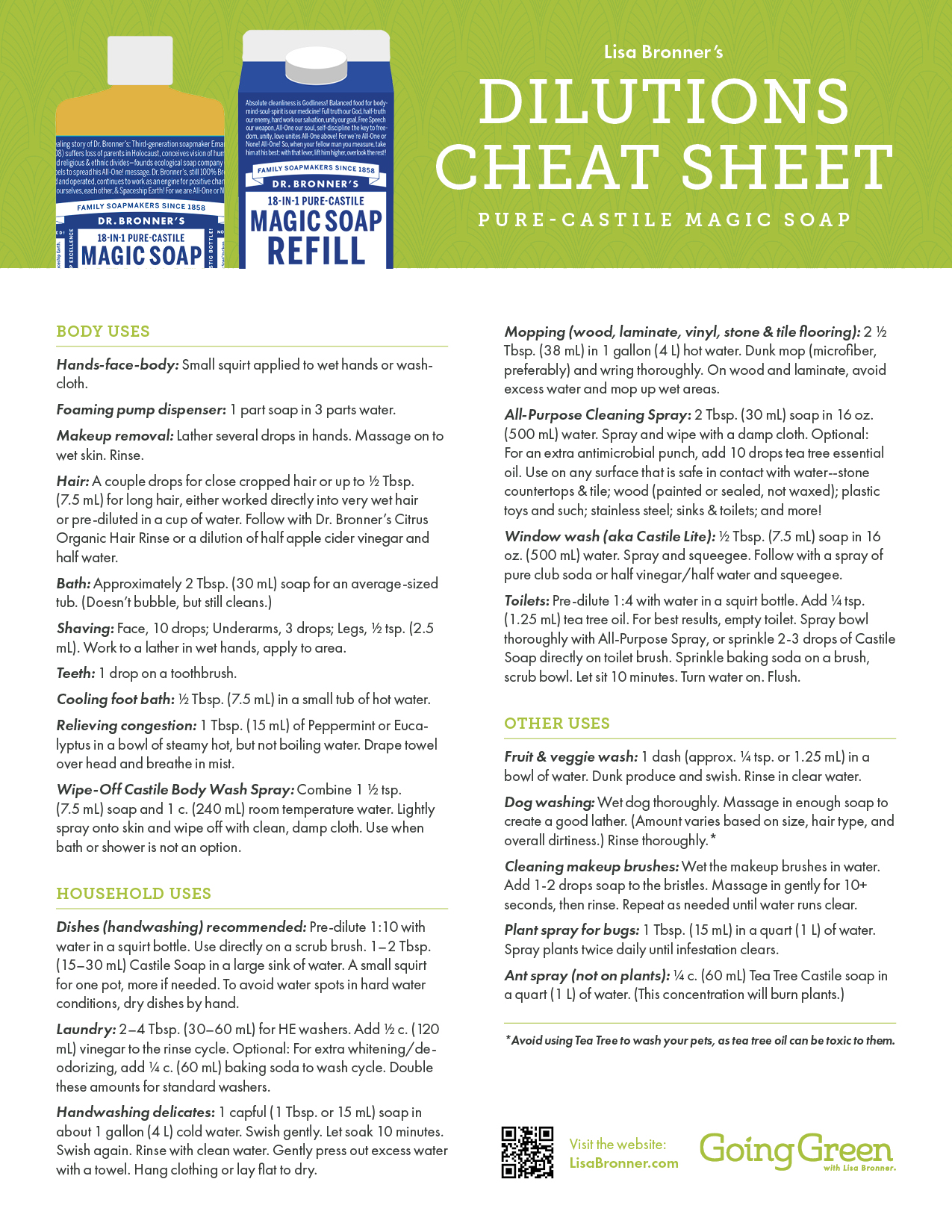
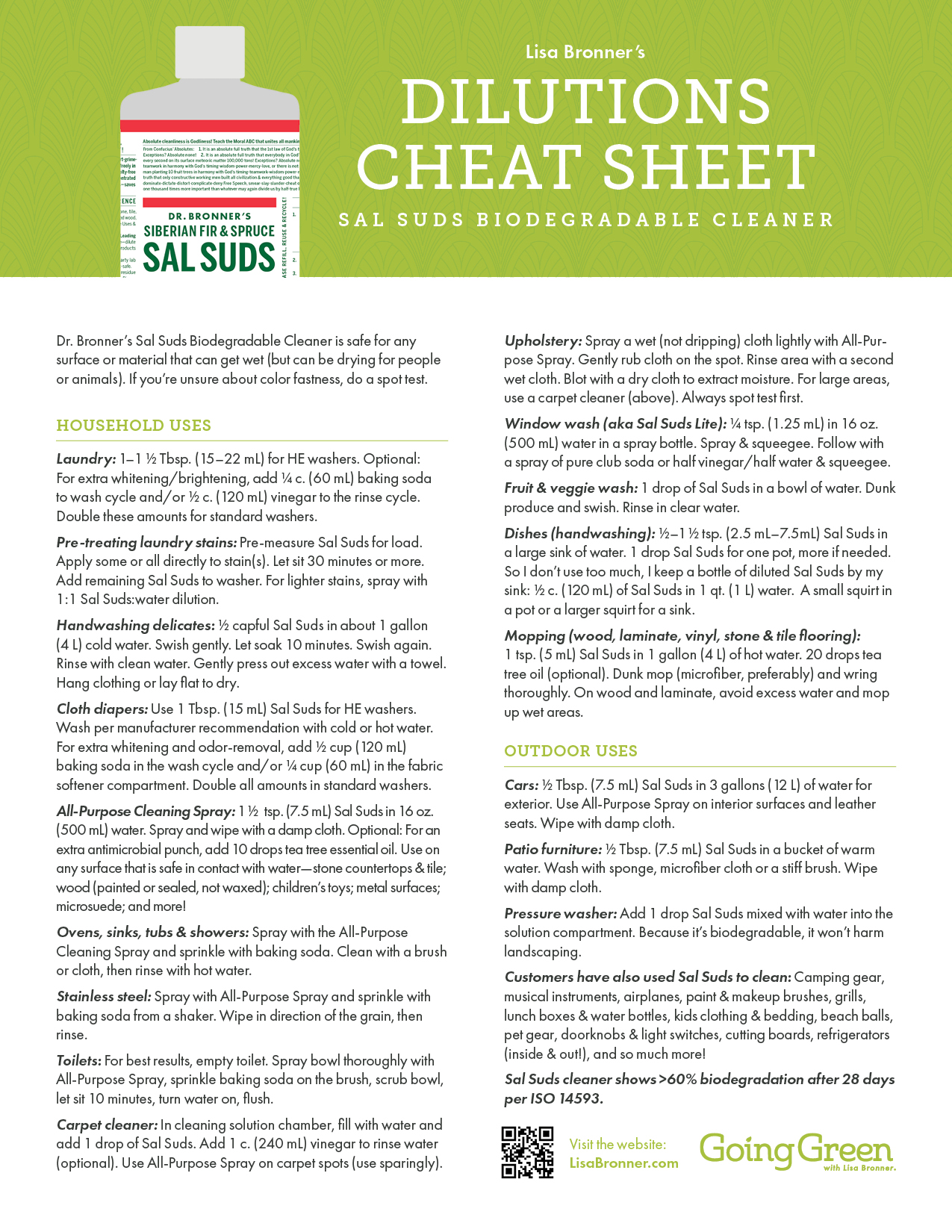
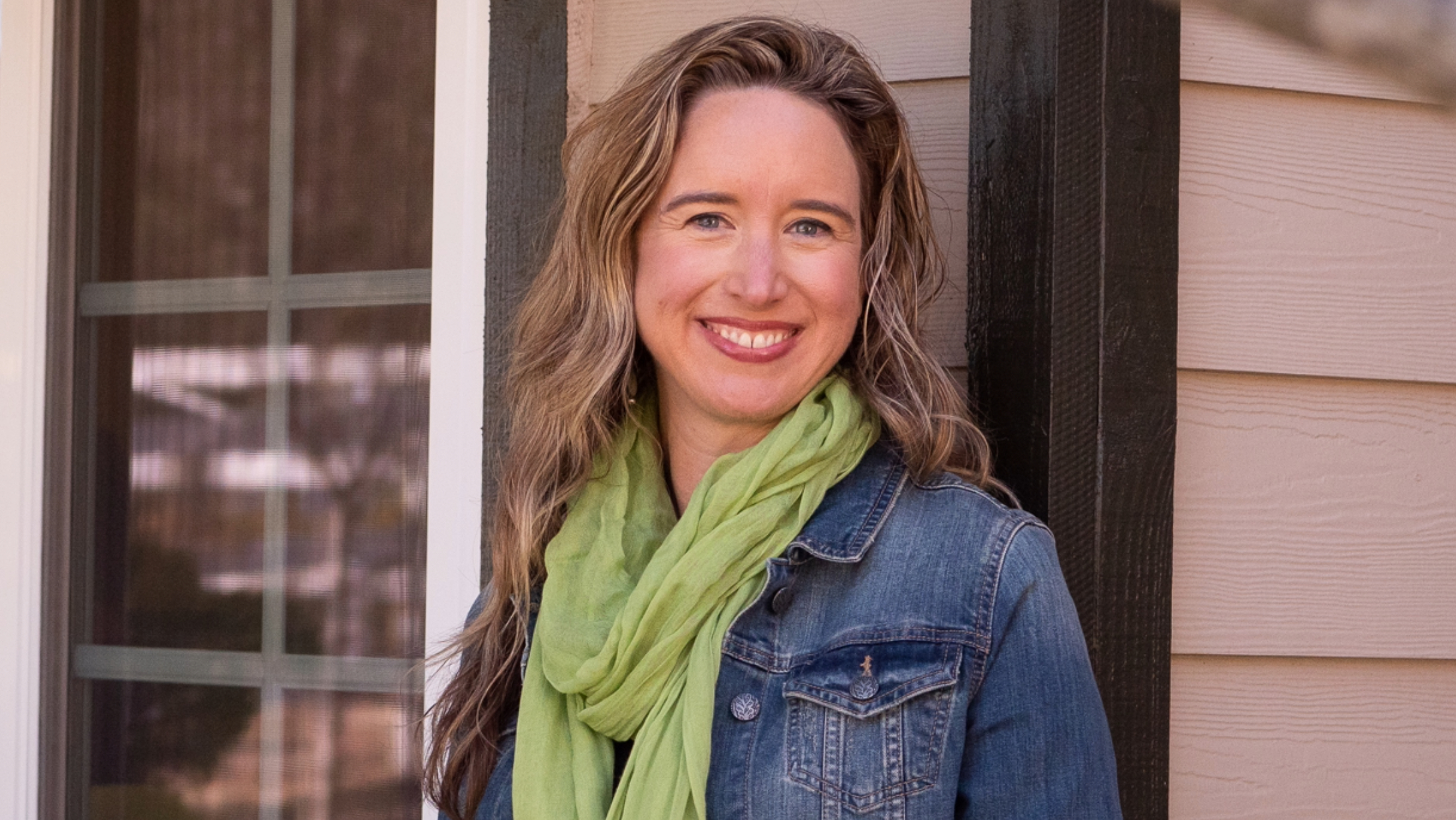
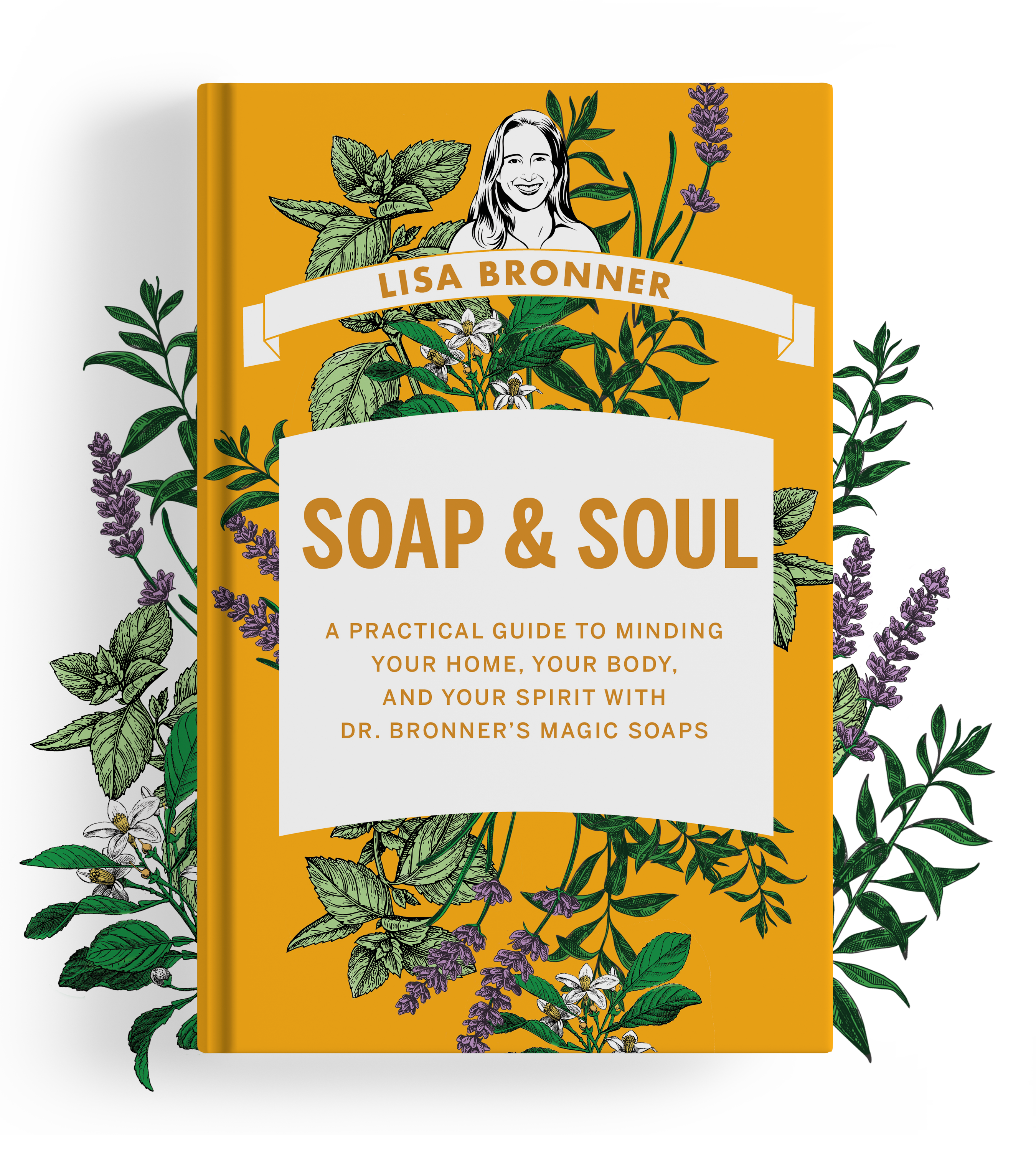
I tried the GIY soft scrub you showed us in a previous video and it works amazing! I couldn’t believe how well it worked as a toilet bowl cleaner and a sink cleaner. I used the citrus Castile soap and it made it smell so fresh. I also tried the GIY glass cleaner and it works so well! I’m never going back to conventional cleaners. Thank you for all of your recipes!
Hi Emerick – I am so very glad that my recipes have been such a help to you. In fact, it almost sounds like you’re having FUN while cleaning. Is that even allowed?? Yes, it most certainly is! Thanks so much for sharing your successes.
Hi Lisa!
I love your family’s story and all of your products! I have a couple of questions I would love to get your opinion on. My toilets have had calcium build up for a very long time leaving nasty brown marks in the bowl. I was wondering if white vinegar would help get rid of that if I let it sit overnight. I just recently realized the importance of using green products and I didn’t want to use dangerous chemicals. Also, do you think that adding a small amount of white vinegar to the multi-purpose spray you showed us in the video would help break down residue. I always say that vinegar is nature’s bleach! I also wanted to ask if Dr Bronner’s will ever release an all-natural deodorant?
Thank You!
Hi Emerick – I’m glad to hear you’ve found our products along your green journey! For the calcium build ups, an acid such as distilled vinegar will dissolve them. For best results, turn off the water to the toilet. Spray the toilet with a half vinegar/half water solution. Let it sit for 10 minutes. Scrub off. Another option is scouring it. Instead of vinegar, use the Castile soap with a good sprinkle of sodium bicarbonate. Scrub this well with a toilet brush. Avoid adding vinegar to the All-Purpose Spray as it will either react with the Castile Soap in a base-acid reaction or reduce the efficacy of Sal Suds.
I’ve been on a deodorant journey myself and I’ll be sure to share your suggestion, but at Dr. Bronner’s we do not move very quickly in bringing out new products. We like to do what we do really well and keep things simple. We really spend a long time formulating, testing, and ensuring that there’s a need for the product and that the ingredients are of the highest integrity, and all that.
The Environmental Working Group has a database of body care products ranked by ingredients, environmental impact and such, which is a helpful resource for researching new products. https://www.ewg.org/skindeep/.
Hi Lisa! I’ve noticed in a few of your blogs that you mentioned that you have reverse osmosis. I have researched it to death but it’s hard to tell which ones are good. There are very few sites that say which ones they feel are rated well. Would you mind sharing which one you have and if you like it? Thanks!
Hi Vickie – The whole water filtration market is a rapidly changing environment. I think I’ve had my system for about 10 years, and I’m sure there have been developments since then. Mine is an Ecowater system. I do like it. The water tastes great and I can tell in how clear my soap solutions that I make with it are that the mineral content is greatly reduced.
How do you wash all your microfiber cloths?Im going to be moving soon and will be using this guide to GIY my household cleaners,so I’m learning what I can now.
Hi Melissa – I wash my microfiber cloths in my washer on hot with Sal Suds (3 Tbsp in my standard machine), 1 cup of baking soda sprinkled over the clothes, and 1/2 c. of vinegar in the fabric softener compartment. I’ve had my cloths for many years, but for new cloths, they can shed microplastics for about the first seven washes, and so washing them inside something like the Guppy Friend will catch those. Welcome to the green team! Let me know if I can be of further help.
Hi Lisa! Could you give me a link to the microfiber cloths you recommend? For some reason, I’ve never been able to find any that perform in the way so many people rave about. Thank you!
Hi Anne Marie- I buy the pack of microfiber cloths Costco sells in the auto section. They’re a good value and good quality.
Thanks for the video, I would try soon,
I wish to buy your products from Costco here. I purchased before not nowadays, love your castile soap very much.💕
Hi Marina- It’s great to hear you’re a fan of our soap! If you can’t find our Peppermint Castile Soap in Costco, try natural food store, or Walmart or Target, in your area.
Hello! Love your products. The magic balm is a life saver for winter hands. Question, I haven’t been able to find a giy for leather furniture… Any ideas?
Hi Janna- I hear you! The balm has been getting lots of use at our house too. Depending on what you have on hand, either the Sal Suds All-Purpose Spray (1 Tbsp. in a quart of water) or the Castile All-Purpose Spray (1/4 cup in a quart of water) will do a quick clean of leather. If it needs to be nourished, you may want to look into a leather polish made from 1/3 c. vinegar with 2/3 c. olive oil and 1/2 tsp. pure essential lemon oil. Shake this up and rub it on with a soft rag. Spot test in an inconspicuous spot before use.
Great stuff. Simple, effective, safe, and cheap. I advise not to use microfiber cloths, however; they are made of plastic! Cotton is safer.
Hi Eric- Thanks for the kind words! I have gone back and forth on the rag option – both have their pros and cons! Cotton is a water, chemical, and labor intensive crop. Microfiber is plastic, though hopefully PCR depending on the manufacturer. I think the best thing is to have something that is reusable so that we’re not consuming new resources and not contributing to waste. So many things to consider!
Thank you!! Those look very easy to make but what do you use on hard water stain in the toilet. Do you have any suggestions for that?
Hi Becky – Hard water stains are mineral deposits. The best way to lift them is either with a good scrub, such as the GIY Soft Scrub, or dissolving them with an acid, such as vinegar. With the soft scrub, squirt this under the rim of the bowl and brush thoroughly. Let it sit for 10 minutes, and then flush. With the vinegar, I’d pour a cup or so into the toilet bowl, brush thoroughly, let it sit 10 minutes, then flush.
will this kill the hepatitis C virus?
Hi Zhinka – We have not had Dr. Bronner’s products tested specifically against Hepititis-C. Our soap products are effective cleaners but are not disinfectants since they do not contain a pesticide and do not kill, but instead work effectively by attaching to dirt, germs, and grime and rinsing them away, leaving clean surfaces behind. Disinfectants are chemicals used on hard surfaces and are registered with the EPA. Dr. Bronner’s castile soaps and Sal Suds are effective cleaners, but not EPA-registered chemical surface disinfectants.
Thank you.
I love your products.
Thank you.
Thank you for being a customer, Sheila!
PLEASE do NOT use microfiber cloths!! There cause major environmental damage and are definitely NOT “green”. Furthermore, in my experience, old cotton T-shirts do a better job, especially on glass.
Do your research please.
Hi Aunt Jam – Thank you for calling attention to microfiber pollution. Patagonia sells a great tool to help with this. The concern is that non-biodegradable microfibers can sluff off the clothes during laundering and end up in our waterways. This is more of an issue with newer and lower quality microfiber. Cloths that have been washed repeatedly don’t tend to shed. Either way, the Guppyfriend bag catches these particles, which can then be wiped out and disposed of in the trash. Choosing which type of cleaning cloths to use presents issues either way. Microfiber is a great way for responsible manufacturers to make use of our abundance of recycled plastic. However, it is still plastic. Cotton is an extremely water, chemical, and labor intensive crop that is increasingly genetically modified. However, you can use repurposed cotton from old t-shirts, cloth diapers, burp cloths, or socks. Lots to think about here.
[…] Learn more about making the first three items in my GIY Starter Kit video. […]
These natural cleaners are awesome. There’s one thing I worry about these days with cleaning: does my cleaner have a disinfectant? With our current pandemic disinfecting seems even more important.
Hi Martha – The Castile and Sal Suds are effective cleaners but are not disinfectants since they do not contain a pesticide. Soap removes all debris – be it dirt, grime, germs, etc. Disinfectants kill living organisms, but do not remove them and have no impact on non-living dirt. Cleaning with soap and water is the first step the CDC recommends these days, and ever after I imagine. We have not specifically tested our products on the coronavirus COVID-19. However, we do know that Dr. Bronner’s Pure-Castile Soaps and Sal Suds Biodegradable Cleaner are effective cleaners, and work by attaching to dirt, germs, and grime and rinsing them away, leaving clean surfaces behind.
Hello Lisa. I’d like to please share the recipes to clean wood floors and granite countertops using either castle soap or soap suds. I love your blog, is so informative, and since I learned about your products I’ve become more conscious about the environment and the effects on earth about using other products with so many quemicals on them. From now on I’m going green team!☺
Hi Mario – I’m so glad you’ve found my blog helpful and that it has inspired you in your own green journey. You are welcome to share my recipes and welcome, so long as you share the source. I appreciate your taking the time to ask!
Hello again Lisa. What I meant on my previous comment was if you can share with me what products can I use to clean wood floors and granite countertops. Do you have the recipes for those surfaces??
Thank you so much, and like always, I love your blog and your products.
Hi Mario – Whoops! I misunderstood your first post. Sal Suds works great on wood floors. You need a very mild dilution or else you’ll end up with a bunch of bubbles and will need to rinse. If it’s diluted enough, you will not need to rinse. If you’re using a mop pad and bucket, a dilution of about 2 gallons of water and 1 tsp. of Sal Suds. Add the water to your bucket first and then the Sal Suds to avoid a bubble overflow. Also, excess water on laminate flooring will cause it to swell, so be sure to wring your mop out well before using and mop up an excess water. As for granite, you can use either our Castile Soap or Sal Suds. Dilute the Castile Soap with water in a spray bottle using the All-Purpose Cleaning Spray (recipe here: https://www.lisabronner.com/wp-content/uploads/2012/09/Dilutions-Cheat-Sheet.pdf), spray on your counters, then wipe off with a damp cloth. Here are Sal Suds recipes and uses: https://www.lisabronner.com/sal-suds-dilution-cheat-sheet/. With those two pages, you should be up and running!
Hello Lisa, I can’t thank you enough. Thanks for the advice, thanks for for taking the time time to reply, thanks for the wisdom you share in your blog…thank you, thank you thank you. Did I mentioned we love your products and your blog?? I think I did, but can’t help it. We are green now since we learned about Dr Bronner soap and its wonders, and you, for being the best ambassador fir them. Honestly your response, so quick and assertive surprises me, and fir that I thank you too.
I’ve seen a lot of bloggers and videos, and by far yours are the bestest!!!! I dont know if that’s even a word but for you, I’ll creat it. Keep up the good work ??and God bless.. The CHAMP???.
Thank you for the kind words!
How long do all these products keep once made up? Is there any risk of bacteria developing in them after a certain period of time?
Hi Katherine – Diluting the soap does dilute its preservation. It is naturally preserved by its own alkalinity as well as the tocopherols (vitamin E) that we add. Its shelf life undiluted is at least three years. I have found that the All Purpose Spray here lasts at least a month, probably longer but I run out of it. If it is smelling “off” to you, then dump and remake. Perhaps make a smaller batch next time around. With the vinegar glass cleaner, I have never found this to go bad, but again, if it smells wrong to you, then dump and remake.
Any guidance for choosing spray bottles without their own chemicals and nasty leaching additives?
Hi Kerri – I do recommend buying empty spray bottles instead of repurposing one that might have had problematic ingredients which could have leached into the plastics. Also choose sturdy bottles instead of pretty ones. Plastics that are HDPE 1 or 2, so they wouldn’t have BPA in them. Another option is to buy glass spray bottles. These are pricier and obviously breakable, but if you are fairly coordinated and don’t have little ones around, they could be a good option.
PLease could you tell me how to make washing up liquid. Thank you 🙂
Hi Maggie – As luck would have it, I was just reading another blog that mentioned that what Americans call “dish soap”, Brits call “washing up liquid”, so I know what you’re talking about! How’s that for cross-cultural communication?? Anyhow for washing dishes, I use Sal Suds because soap (which is what the Castile is) has a tiny reaction with hard water that can leave a film on shiny surfaces (aka “soap scum”). Sal Suds is much more clean rinsing. I keep a quart bottle filled a quarter of the way with Sal Suds and the rest with water. This way I don’t use too much Sal Suds (which is the concern when not diluting. It’s not like more Sal Suds is toxic. It’s not. It’s just unnecessary and wasteful.)
Where do you get mason jar lid with the daisy shape cut out lid?
Hi Brandi – I believe we ordered it online. Search for “daisy cut out mason jar lid”.
Thanks! I looked and found them in several places. I ordered mine from Wal-mart.
Glad you found them!
Thank you so much for sharing this information!
This was great, thank you! How do I make liquid hand soap? The non foaming kind.
thx!
Hi Miriam – The Castile soaps do not work well in traditional pumps. They inevitably dry inside the apparatus and cause soap to shoot out sideways or up. Even diluted, this will happen. Instead, either keep the soap in the original bottle and use just a few drops, or consider our Organic Sugar Soaps which we formulated to work in traditional pumps.